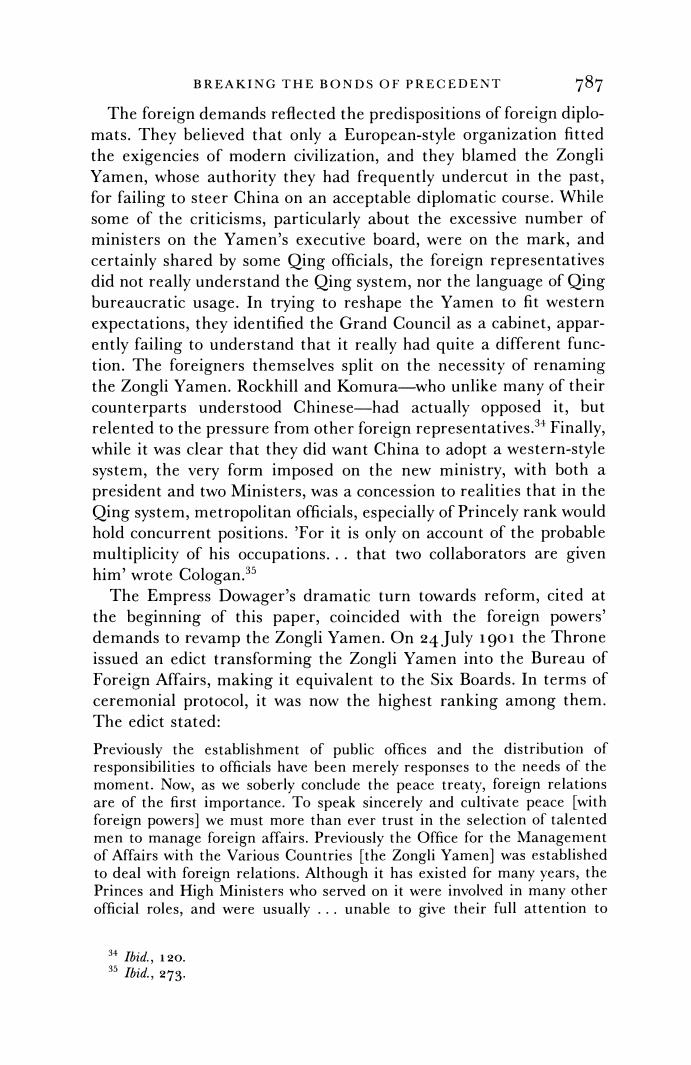正在加载图片...

BREAKING THE BONDS OF PRECEDENT 787 The foreign demands reflected the predispositions of foreign diplo- mats.They believed that only a European-style organization fitted the exigencies of modern civilization,and they blamed the Zongli Yamen,whose authority they had frequently undercut in the past, for failing to steer China on an acceptable diplomatic course.While some of the criticisms,particularly about the excessive number of ministers on the Yamen's executive board,were on the mark,and certainly shared by some Qing officials,the foreign representatives did not really understand the Qing system,nor the language of Qing bureaucratic usage.In trying to reshape the Yamen to fit western expectations,they identified the Grand Council as a cabinet,appar- ently failing to understand that it really had quite a different func- tion.The foreigners themselves split on the necessity of renaming the Zongli Yamen.Rockhill and Komura-who unlike many of their counterparts understood Chinese-had actually opposed it,but relented to the pressure from other foreign representatives.3 Finally, while it was clear that they did want China to adopt a western-style system,the very form imposed on the new ministry,with both a president and two Ministers,was a concession to realities that in the Qing system,metropolitan officials,especially of Princely rank would hold concurrent positions.'For it is only on account of the probable multiplicity of his occupations...that two collaborators are given him'wrote Cologan.35 The Empress Dowager's dramatic turn towards reform,cited at the beginning of this paper,coincided with the foreign powers' demands to revamp the Zongli Yamen.On 24July 1901 the Throne issued an edict transforming the Zongli Yamen into the Bureau of Foreign Affairs,making it equivalent to the Six Boards.In terms of ceremonial protocol,it was now the highest ranking among them. The edict stated: Previously the establishment of public offices and the distribution of responsibilities to officials have been merely responses to the needs of the moment.Now,as we soberly conclude the peace treaty,foreign relations are of the first importance.To speak sincerely and cultivate peace [with foreign powers]we must more than ever trust in the selection of talented men to manage foreign affairs.Previously the Office for the Management of Affairs with the Various Countries [the Zongli Yamen]was established to deal with foreign relations.Although it has existed for many years,the Princes and High Ministers who served on it were involved in many other official roles,and were usually...unable to give their full attention to 3+Ibid.,120. 35bid,273BREAKING THE BONDS OF PRECEDENT 787 The foreign demands reflected the predispositions of foreign diplomats. They believed that only a European-style organization fitted the exigencies of modern civilization, and they blamed the Zongli Yamen, whose authority they had frequently undercut in the past, for failing to steer China on an acceptable diplomatic course. While some of the criticisms, particularly about the excessive number of ministers on the Yamen's executive board, were on the mark, and certainly shared by some Qing officials, the foreign representatives did not really understand the Qing system, nor the language of Qing bureaucratic usage. In trying to reshape the Yamen to fit western expectations, they identified the Grand Council as a cabinet, apparently failing to understand that it really had quite a different function. The foreigners themselves split on the necessity of renaming the Zongli Yamen. Rockhill and Komura-who unlike many of their counterparts understood Chinese-had actually opposed it, but relented to the pressure from other foreign representatives.34 Finally, while it was clear that they did want China to adopt a western-style system, the very form imposed on the new ministry, with both a president and two Ministers, was a concession to realities that in the Qing system, metropolitan officials, especially of Princely rank would hold concurrent positions. 'For it is only on account of the probable multiplicity of his occupations... that two collaborators are given him' wrote Cologan.35 The Empress Dowager's dramatic turn towards reform, cited at the beginning of this paper, coincided with the foreign powers' demands to revamp the Zongli Yamen. On 24July 1901 the Throne issued an edict transforming the Zongli Yamen into the Bureau of Foreign Affairs, making it equivalent to the Six Boards. In terms of ceremonial protocol, it was now the highest ranking among them. The edict stated: Previously the establishment of public offices and the distribution of responsibilities to officials have been merely responses to the needs of the moment. Now, as we soberly conclude the peace treaty, foreign relations are of the first importance. To speak sincerely and cultivate peace [with foreign powers] we must more than ever trust in the selection of talented men to manage foreign affairs. Previously the Office for the Management of Affairs with the Various Countries [the Zongli Yamen] was established to deal with foreign relations. Although it has existed for many years, the Princes and High Ministers who served on it were involved in many other official roles, and were usually . . . unable to give their full attention to 34 Ibid., 120. 5 Ibid., 273